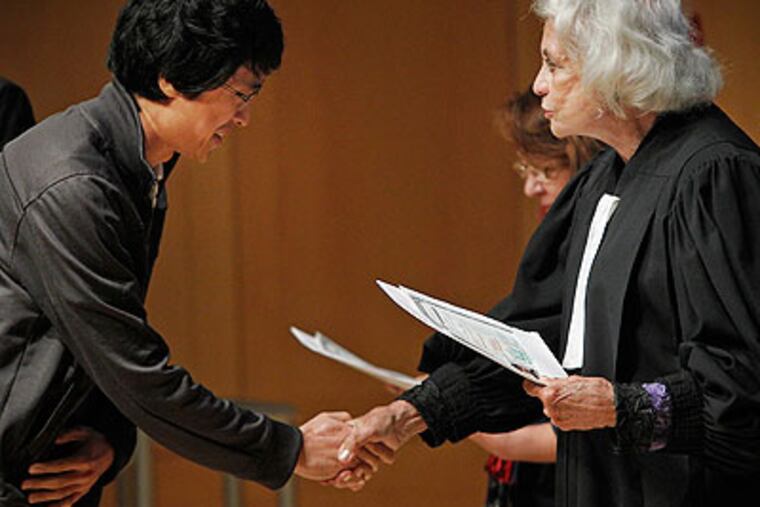A day to celebrate the Constitution
"IF YOU WANT a job, go help your neighbor." So says David Smith, executive director of the National Conference on Citizenship, who released a report yesterday suggesting that communities with stronger levels of civic engagement have seen smaller increases in unemployment during recent years.

"IF YOU WANT a job, go help your neighbor."
So says David Smith, executive director of the National Conference on Citizenship, who released a report yesterday suggesting that communities with stronger levels of civic engagement have seen smaller increases in unemployment during recent years.
Smith, speaking at the National Constitution Center, said he realizes that that statement simplifies things, but "as people volunteer, they develop marketable skills and increase their social networks."
The push to get more people civically involved was a major thrust of yesterday's Constitution Day celebration at the center, 6th and Arch streets.
Retired Supreme Court Justice Sandra Day O'Connor, the first woman justice, spearheaded the day's activities by leading 224 students from Constitution High School in a reading of the Preamble to honor the 224th anniversary of the Constitution's signing.
O'Connor, 81 and vibrant, told reporters after the reading that her iCivics project (www.icivics.
org) was designed with today's youth in mind.
"Young people - they like to play games on the Internet," she said. And on iCivics, they can play games.
O'Connor said she realizes civics classes "can be deadly dull." But she encouraged educators to teach civics "and make it more interesting."
Another report released yesterday, "Guardian of Democracy," revealed staggering statistics about Americans' low proficiency on civics.
For instance, in 2006, "fewer than half of Americans could name the three branches of government," the report says.
O'Connor also spoke during a naturalization ceremony at the center for 48 people from 18 countries - including Argentina, Belarus and China.
"I keep a copy of the Constitution all the time in my purse," she told the soon-to-be American citizens.
Another moving ceremony took place in front of the "American National Tree" exhibit, which honors Americans who have made an impact on the nation's constitutional history.
The late Abel Meeropol - who penned the haunting poem "Strange Fruit" about the horrors he felt when he saw a photo of two black men hanging from a tree in Marion, Ind., in 1930 - was inducted as the exhibit's newest member. A Bronx teacher, he later became more known for adopting the two sons of accused spies Julius and Ethel Rosenberg after their 1953 execution.
One of the sons, Michael Meeropol, who attended the event, said his father fought for racial justice and would "remind us we still have a long way to go."
Abel Meeropol was added to the exhibit because he was the subject of this year's winning student-essay contest, written by Ruthie Prillaman, a senior at Richard Montgomery High School, in Rockville, Md.
Her essay begins with the first lines of the poem, which was turned into a song, most famously performed by Billie Holiday:
"Southern trees bear strange fruit, Blood on the leaves and blood at the root, Black body swinging in the Southern breeze, Strange fruit hanging from the poplar trees."